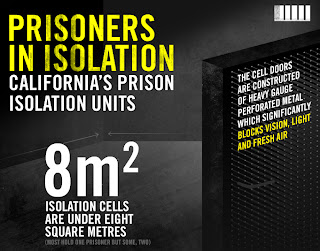UPDATE: Read Amnesty's statement released for the Feb. 25, 2013 CA State hearing on SHUs (w/ protest rally outside organized by anti-SHU activists): Proposed reforms will not alleviate the inhumanity of conditions in Security Housing Units in California’s prisons.


Amnesty International Denounces Human Rights Violations in California
Prisons
--An interview with Tessa Murphy
By Angola 3 News
“California Department of Corrections/PBSP-SHU policies and
practices, have violated our human rights and subjected us to torture – for the
purpose of coercing inmates into becoming informants against other inmates,
etc., for the state,” writes one prisoner held in solitary at California’s
infamous supermax Pelican Bay State Prison. This excerpt of his letter to the
internationally renowned human rights organization, Amnesty International, is
featured in Amnesty’s new report on the use of prolonged solitary confinement
inside California’s ‘Security Housing Units’ (SHUs), entitled The Edge of Endurance: Conditions in California’s Security Housing Units.
The Amnesty report states that “no other US state is
believed to have held so many prisoners for such long periods in indefinite
isolation.” At least 3,000 California prisoners are being held today in an
extreme form of solitary confinement known as “super maximum” custody.
Furthermore, the CDCR reported in 2011 that over 500 prisoners had spent over
ten years in the Pelican Bay SHU, with 78 having spent over 20 years there. Explaining
the recent emergence of SHUs, Amnesty writes that “California was at the
forefront of moves to toughen penalties, and its prison population escalated
during the 1980s and 1990s following the introduction of some of the nation’s
harshest sentencing laws. Once a leader in the philosophy of rehabilitation,
California also passed legislation which expressly described punishment rather
than rehabilitation as the central aim of imprisonment. Pelican Bay SHU, which
opened in 1989, was one of the first super-maximum security facilities
specifically designed to be ‘non- programming,’ that is, constructed with no
communal space for recreation, education or any other group activity.”

